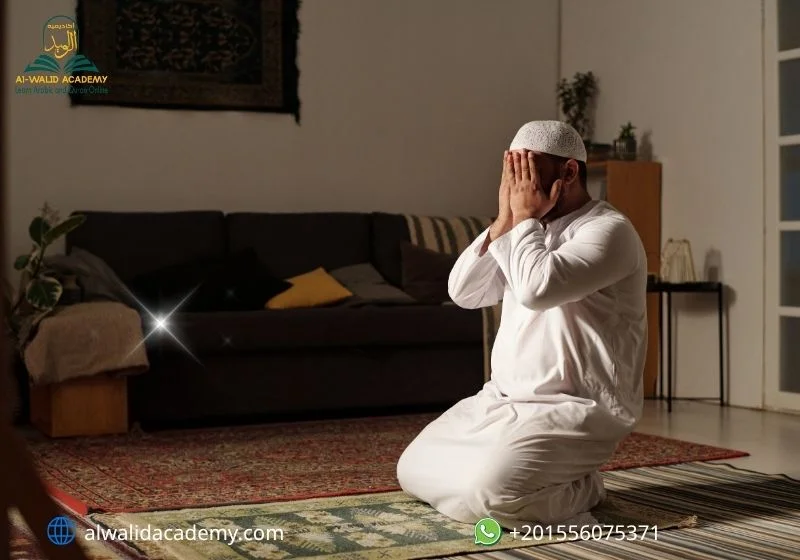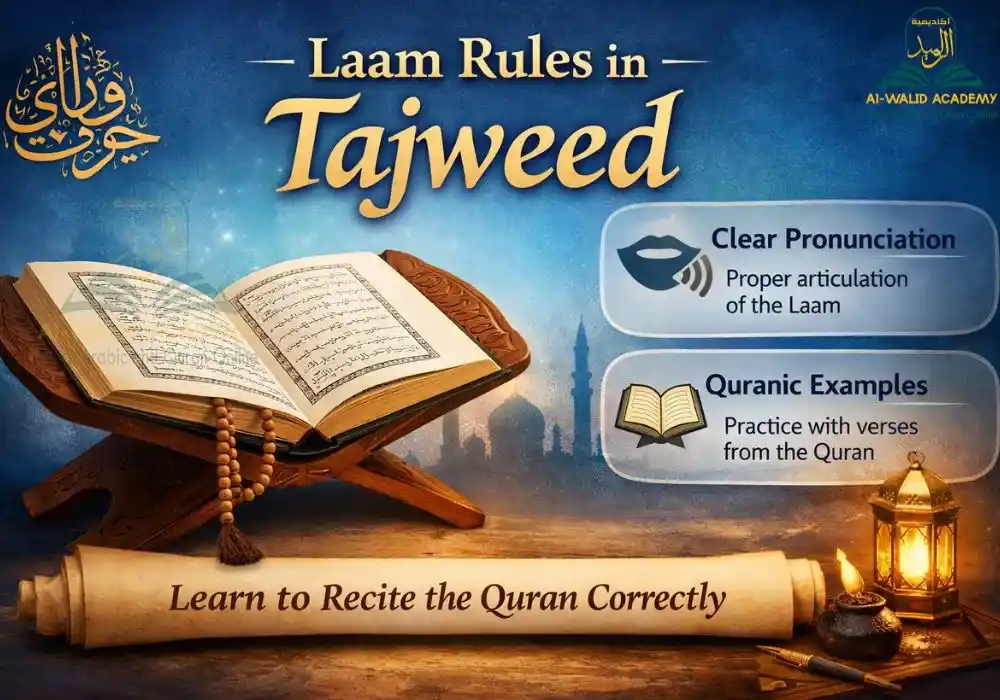Salah in Islam is considered the main pillar upon which the religion stands and a practice that strengthens a believer’s faith.
Allah, the Almighty, made it obligatory on every Muslim man and woman as a direct connection between the servant and the Creator.
When we talk about How To Pray In Islam In Arabic, we must realize that Salah is not just repeated actions, but a spiritual journey that combines feelings in the heart, words on the tongue, and movements of the body.
Why Learn Salah in Arabic?
Learning How To Pray In Islam In Arabic isn’t just a formality; it’s something essential because the Qur’an was revealed in this language, and every dua we say during prayer is originally Arabic.
When a Muslim recites in the original words, the meaning feels deeper and the connection becomes stronger.
For someone new to Islam or not yet comfortable with Arabic, it’s okay to start with transliteration, like: Allahu Akbar = الله أكبر, Subhana Rabbiyal A‘la = سبحان ربي الأعلى. Step by step, with practice, the words in Arabic become easier to pronounce, and the spiritual experience becomes more meaningful.
Praying in Arabic allows you to live the very words Allah revealed, bringing more focus and presence into your prayer.
With so many Quran courses online, you can easily find guided programs to improve your Salah from home.
The Spiritual Value of Salah
Salah isn’t just a command to follow; it’s a source of peace and comfort. The Prophet used to say: “Bring us comfort through it, O Bilal,” which shows that prayer was a true relief for him.
When you stay consistent in Salah, you feel closer to Allah, and your sins gradually fade away. It’s a chance to disconnect from the worries of life and enter a moment of calmness with your Creator.
Every prostration lifts a weight off your shoulders, and every rak‘ah gives you strength and patience. With time, you’ll feel your heart more attached to Allah, and your whole life shifting towards peace and positivity.
If you want to strengthen your Salah in Arabic, joining a Quran Memorization Course can help you connect deeply with every verse you recite.
The Five Daily Prayers in Islam
The five daily prayers are the foundation that keeps a Muslim connected to Allah throughout the day.
Allah, the Almighty, made them obligatory so that a believer’s life remains filled with His remembrance, starting at dawn and ending at night.
Each prayer has its specific time and a unique name that reflects its meaning.
Names of the Prayers in Arabic and English
Before diving into the prayer times, it’s important to know the names of the five daily prayers in both Arabic and English.
This is especially helpful for new Muslims or when explaining to non-Muslims.
- Fajr (الفجر): The first prayer of the day, offered at dawn.
- Dhuhr (الظهر): The midday prayer, performed after the sun passes its zenith.
- Asr (العصر): The afternoon prayer, prayed before sunset.
- Maghrib (المغرب): The prayer at sunset, performed immediately after the sun sets.
- Isha (العشاء): The night prayer, offered after twilight disappears.
Read more about: New Muslim Convert Guide
Timing of Each Prayer
Knowing the timings of Salah is essential because it marks the moments of direct connection between the servant and Allah. These timings were divinely set to cover the entire day.
- Fajr: Begins at the first light of dawn and lasts until sunrise.
- Dhuhr: Starts after the sun passes its highest point and continues until Asr.
- Asr: From the afternoon until just before sunset.
- Maghrib: From the moment the sun completely sets until Isha.
- Isha: Begins after Maghrib when twilight disappears and extends until midnight.
Why Are the Prayers Spread Throughout the Day?
This distribution is full of wisdom. It ensures that a Muslim receives spiritual breaks and reminders of Allah at different times:
- Fajr: Starting the day with blessing and clarity.
- Dhuhr: A pause for peace in the middle of daily responsibilities.
- Asr: A reminder before the day comes to an end.
- Maghrib: A time that often brings family together as night begins.
- Isha: Closing the day with calmness and tranquility.
Importance of Knowing the Names and Times
Understanding the names and times of the daily prayers helps Muslims stay organized in both worship and life.
Knowing them in Arabic and English makes it easier to teach new Muslims, and committing to the times gives inner peace and structure.
Preparation Before Prayer
Before a Muslim starts praying, it’s important to prepare properly. This preparation isn’t just a formality—it’s a condition that makes the prayer valid and helps the heart and mind focus on worship.
1.Purification (Wudu)
The first step is performing wudu, which means washing specific parts of the body in a set order to be clean and spiritually ready. The steps are:
- Wash the face.
- Wash the arms up to the elbows.
- Wipe the head.
- Wash the feet up to the ankles.
The intention should be: “Nawaytu al-wudu li raf‘ al-hadath” (I intend to perform wudu to remove impurity).
Wudu is not just physical cleanliness—it also refreshes the soul before standing in front of Allah.
Read about: How to Perform Wudu
2.Facing the Qibla
After completing wudu, the worshiper must face the Qibla, which is the Kaaba in Mecca. This direction unites Muslims all over the world, symbolizing the unity of the entire Ummah in worship.
3.Dress Code in Prayer
Clothing is also an important part of prayer. It should be modest and clean:
- For men: covering at least the area between the navel and the knees.
- For women: wearing modest clothing, with the hijab covering the entire body properly.
Wearing modest attire reflects respect and humility, giving the prayer deeper meaning and spirit.
Step-by-Step Guide to Salah in Arabic

Learning Salah is easier when explained step by step, since every part has its own movement and special words with deep meaning.
Many reverts start with Quran Classes for Adults to learn how to pray in Arabic step by step with proper pronunciation.
1.Opening Takbir (Allahu Akbar)
At the very start of prayer, raise your hands and say:
Allahu Akbar – (Allah is Greater than everything).
This marks the moment you enter into prayer, standing humbly before Allah.
2. Recitation of Al-Fatiha and a Surah
After the Takbir, recite Surah Al-Fatiha in full:
- “Alhamdu lillahi rabbil ‘alamin”, All thanks and praise belong to Allah, the Sustainer of all existence.
- Then follow it with a short Surah, such as Al-Ikhlas: Qul huwa Allahu ahad” Proclaim: Allah alone is One and Unique.
This recitation is the core of Salah, reminding you of Allah’s greatness and mercy.
3.Ruku (Bowing) and its Phrases
Bend down, placing your hands on your knees, and say three times:
Subhana rabbiyal ‘azim – (Glory be to my Lord, the Great).
Ruku teaches humility and reminds you to bow in submission before Allah.
4.Sujood (Prostration) and Supplications
Next, go into sujood, placing your forehead, nose, hands, knees, and toes on the ground, and say:
Subhana rabbiyal a‘la – (Glory be to my Lord, the Most High).
Prostration is the closest moment to Allah, making it the best time for heartfelt supplications.
5.Tashahhud and Final Salam
While sitting at the end of prayer, recite the Tashahhud:
“At-tahiyyatu lillahi was-salawatu wat-tayyibat…” – (All greetings, prayers, and good deeds are for Allah…).
Finally, end the prayer by turning your head to the right and left, saying:
As-salamu ‘alaykum wa rahmatullah – (Peace and mercy of Allah be upon you).
This completes the Salah, but its blessing and inner peace remain with you throughout the day.
Read about: How to pronounce the Shahada
Common Arabic Phrases Used in Salah

Salah is filled with core phrases and supplications that Muslims repeat in every rak‘ah.
These aren’t just words, but acts of remembrance and worship that connect the heart to Allah and give prayer its spiritual depth.
That’s why it’s very important for every Muslim to memorize them and understand their meaning, especially beginners.
Learning the rules through a Tajweed Course ensures your prayer words are recited as they were revealed.
Essential Duas Every Muslim Should Know
One of the most beautiful and comprehensive duas that can be said during or after Salah is:
“ربنا آتنا في الدنيا حسنة وفي الآخرة حسنة وقنا عذاب النار”
Rabbana atina fi d-dunya hasanah wa fi l-akhirati hasanah wa qina ‘adhab an-nar
(This dua asks Allah for goodness in this life, goodness in the Hereafter, and protection from the Fire).
This supplication covers everything a believer needs: blessings in this world, salvation in the Hereafter, and safety from punishment.
Transliteration and Translation for Beginners
For beginners who find it hard to read Arabic, transliteration makes it easier, along with the meaning in English:
- Allahu Akbar = الله أكبر = God is the Greatest.
- “Subhana Rabbiyal A‘la”: Exalted is my Lord, the Highest, free from every imperfection.
- Subhana Rabbiyal ‘Azim = سبحان ربي العظيم = Glory be to my Lord, the Great.
- As-salamu ‘alaykum wa rahmatullah = السلام عليكم ورحمة الله = Peace and mercy of Allah be upon you.
This method helps new Muslims start practicing Salah from day one, and with time, they can improve their pronunciation in Arabic.
For beginners, Learning Arabic for Beginners is the perfect way to start pronouncing Salah phrases naturally.
Learning Salah Pronunciation in Arabic for Non-Native Speakers
If Arabic isn’t your first language and you’re still learning how to pray, it’s normal to face some challenges with pronunciation.
Correct pronunciation not only makes reading easier but also helps you concentrate more and feel deeper humility in your prayer. The key is to start simple and take it step by step.
-
Listen to Recitations and Repeat Along
One of the best ways to practice is by listening to well-known reciters such as Sheikh Mishary Rashid or Abdul Basit Abdul Samad.
Play the recordings multiple times and try to repeat with the same tone and pace. At first, it might feel difficult, but with time your ear will get used to the correct pronunciation.
-
Use Transliteration as a Starting Point
If Arabic script feels challenging, you can begin with transliteration (writing Arabic words using English letters) to memorize easily. For example:
- “Allahu Akbar” = الله أكبر
- “Subhana Rabbiyal Azeem” = سبحان ربي العظيم
Over time, you can shift from transliteration to reading the actual Arabic script directly.
-
Focus on Pronunciation of Special Letters
Some Arabic sounds don’t exist in other languages, like the letter ḥaa’ (ح) and ‘ayn (ع). Practice producing these letters from their correct articulation points.
You can even stand in front of a mirror to notice how your tongue and mouth move. With repetition, it will start to feel natural.
Common Mistakes to Avoid
While practicing, keep an eye out for some common mistakes:
- Don’t over-extend letters: For example, don’t drag it out like “Allahoooo Akbar.” Keep it natural.
- Don’t confuse letters: Some people mix up (س with ص) or (ذ with ز). Each letter has its own unique sound, so focus on distinguishing them.
- Don’t rush: Take your time and pronounce each word clearly. This helps you remember them better.
Learn about: How Long Does It Take To Become Fluent in Arabic
Teaching Children and New Muslims

Teaching Salah (prayer) to children from an early age, as well as to new Muslims who are just entering Islam, is a very important step.
Prayer is not just a ritual—it’s the beginning of a spiritual connection between the servant and Allah.
That’s why it should be introduced in a simple and encouraging way, helping them take their first steps with ease and confidence.
If you’re totally new, an Online Noorani Qaida Course is a solid foundation for reading Arabic in your prayers.
Simple Phrases for Kids and Beginners
Before going into the full details of Salah, it’s helpful to introduce children or new Muslims to short and simple phrases.
These basic words allow them to participate without difficulty and prepare them for understanding the rest of the prayer.
Examples include:
- Allahu Akbar.
- Alhamdulillah.
- SubhanAllah.
Repeating these words often helps them memorize quickly and get used to pronouncing Arabic naturally.
Teaching kids Salah becomes easier with Quran lessons for Kids online, where they can memorize short Surahs used in prayer.
Step-by-Step Guide to Salah in Arabic
Once they’re familiar with the basic words, you can start teaching them the prayer step by step, with the phrases for each part. This makes it easier to follow and practice.
1.Opening Takbir (Allahu Akbar)
Salah begins with the opening Takbir. The worshipper raises their hands and says: “الله أكبر” (Allahu Akbar – God is the Greatest).
2.Recitation of Al-Fatiha and a Short Surah
After the Takbir, the worshipper recites Surah Al-Fatiha: “الحمد لله رب العالمين…” (Alhamdu lillahi rabbil ‘alamin – All praise is due to Allah, the Lord of the worlds).
Then, they can add a short Surah, like Surah Al-Ikhlas:
“قل هو الله أحد” (Qul huwa Allahu ahad – Say, He is Allah, the One).
To recite Al-Fatiha and Surahs in Salah correctly, a Quran Recitation Course with focus on Tajweed is essential.
3.Ruku (Bowing)
In bowing, the worshipper shows humility before Allah by leaning forward and saying: “سبحان ربي العظيم” (Subhana rabbiyal ‘azim – Glory be to my Lord, the Great).
4.Sujood (Prostration)
Prostration is the closest position a servant can be to Allah. While on the ground, the worshipper says:
“سبحان ربي الأعلى” (Subhana rabbiyal a‘la – Glory be to my Lord, the Most High).
5.Tashahhud and Final Salam
Toward the end of prayer, the worshipper sits and recites the Tashahhud: “التحيات لله والصلوات والطيبات…” (At-tahiyyatu lillahi was-salawatu wat-tayyibat).
Finally, the prayer ends with greetings of peace: “السلام عليكم ورحمة الله” (As-salamu alaykum wa rahmatullah – Peace and mercy of Allah be upon you).
Helpful Tools and Resources
To make learning easier, modern tools can help children and new Muslims practice Salah step by step.
Some of the best resources include:
- Mobile apps that explain Salah with visuals and audio.
- Online courses designed for beginners to learn Salah in Arabic.
- Short, engaging videos made for kids to help them memorize and practice prayers.
With these resources, combined with daily practice, learning Salah becomes easier, more enjoyable, and spiritually uplifting.
How Arabic Changes the Way You Feel in Salah
When you pray in Arabic, you connect deeply with the meanings of the Qur’an and the supplications.
It’s not just words you recite — it’s meanings that reach your heart, making the whole experience more spiritual.
Arabic is the key that links you directly to the words of Allah, giving Salah a richer and more powerful meaning.
Through Arabic Conversation Classes, you’ll not only pray in Arabic but also start feeling comfortable speaking it in daily life.
Learn How to Pray in Arabic with Al-Walid Academy
If you want to learn Salah step by step in Arabic with correct pronunciation and clear explanations, Al-Walid Academy is the perfect place to start.
The academy provides structured lessons that combine knowledge with practical application.
Courses You Can Benefit From:
- Quran Memorization Course: Easy system for memorizing the Qur’an.
- Quran Classes for Adults: Flexible lessons designed for adults.
- Quran Lessons for Kids Online: Simple online classes for children.
- Quran Recitation & Tajweed Course: To perfect your recitation with tajweed.
- Arabic Conversation Classes + Arabic Language Course Online: To master Arabic and understand Salah and du‘a on a deeper level.
With Al-Walid Academy, you won’t just learn Salah — you’ll also open doors to Qur’an memorization, du‘a, and Arabic in an enjoyable and practical way.
Email for inquiries: alwalidacademy42@gmail.com
Contact number: +201556075371
Learn Quran, Arabic, and Islamic Studies with certified teachers in fun, interactive, and personalized sessions. Join thousands of students around the world and begin your path today!
FAQs
Why do we use Arabic in Salah?
Because Salah was originally revealed in Arabic, and the whole Quran is in Arabic. When you say the prayers in the original language, you feel more connected and focused.
Is it okay to pray in my language instead of Arabic?
If you’re new and just starting, you can begin in your own language to understand the meaning. But over time, try to learn Arabic, because that’s what gives Salah its real depth and spiritual taste.
Does Arabic really change how Salah feels?
Definitely! When you say words like “Allahu Akbar” or “Subhana Rabbiyal Azim”, the feeling is totally different. Arabic makes you live the meaning instead of just repeating words.
How can beginners learn Arabic for Salah?
Start small: first learn the opening Takbir, then Surah Al-Fatiha, and later short Surahs like Al-Ikhlas. Listen to recitations and repeat after them. With practice, your ear and tongue will get used to it.
Is learning Arabic phrases for prayer too hard?
At first, it might feel tricky, especially with letters not in your language. But with repetition, it becomes much easier, and each time you’ll feel yourself improving.
What’s the best trick to memorize Arabic in Salah?
In the beginning, use transliteration — writing Arabic words with English letters, like: “Allahu Akbar” = الله أكبر.
This helps you memorize quickly, and later you can shift to reading the Arabic text itself.





